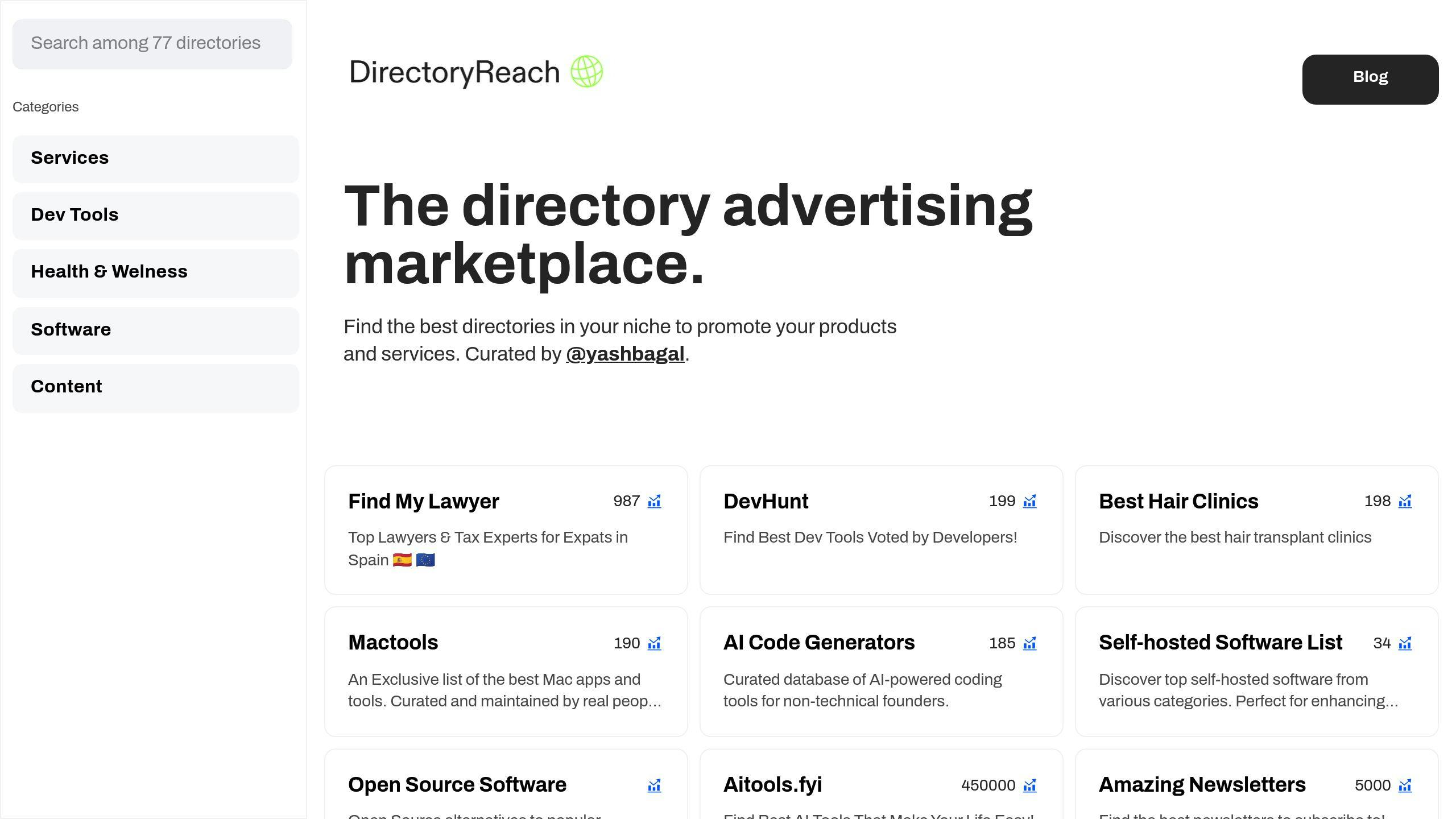Want your business to stand out? Choosing the right business directory is critical. The right platform connects you with your ideal audience, boosts visibility, and improves your online presence. Here’s how to make the best choice:
- Focus on niche directories: These target specific industries or services, like Zocdoc for healthcare or Nextdoor for local businesses.
- Check SEO benefits: Look for directories with high domain authority and organic traffic to improve your search rankings.
- Match your audience: Ensure the directory aligns with your industry, location, and customer intent.
- Evaluate costs: Compare free vs. premium directories to see which offers better ROI for your business goals.
- Use tools: Tools like Ahrefs or DirectoryReach can simplify research and identify top-performing directories.
Quick Comparison:
| Directory Type | Best For | Cost | Benefits |
|---|---|---|---|
| Niche | Specialized services | Varies | Targeted leads, less competition |
| General | Broad offerings | Free/Paid | Wide reach, recognizable name |
| Local | Community-focused businesses | Free/Paid | Local exposure, trust-building |
Start by defining your audience and researching directories that cater to their needs. The right choice can drive growth and deliver measurable results.
How Do Business Directories Work?
How to Evaluate a Business Directory
Choosing the right business directory takes some thoughtful consideration. It’s all about making sure it fits your business goals and connects with the right audience.
Make Sure the Audience Matches Your Niche
The most important thing to check is whether the directory’s audience aligns with your target market. The directory should help you reach people who are already looking for what you offer. For example, a vegan restaurant would benefit more from being listed in specialized food directories or local listings than on a general platform [2].
Here are some key factors to consider:
| Audience Factor | What to Look For | Why It Matters |
|---|---|---|
| Industry Focus | Specialization in your field | Attracts the right kind of customers |
| Geographic Reach | Local or national scope | Matches your service area |
| User Intent | Searches with clear purpose | Increases chances of conversions |
Evaluate Credibility and SEO Benefits
A trustworthy directory can boost both your reputation and online visibility. Directories like Nextdoor, known for their strong domain authority and significant organic traffic, highlight the value of choosing platforms with solid SEO benefits [1].
Here’s how to check a directory’s credibility:
- Look at metrics like domain authority and monthly organic traffic.
- Review the quality of existing business listings.
- Assess the strength of its backlink profile.
By focusing on these factors, you can ensure your listing reaches the right audience and builds trust.
Weigh Costs Against Potential Returns
Think about the costs involved and what you’re likely to gain in return. For example, a paid directory like Turbify, which attracts 11.8K monthly organic visitors, might offer better returns compared to free directories with limited reach [1].
| Directory Type | Initial Cost | Potential Benefits |
|---|---|---|
| Premium Directories | Higher upfront cost | Greater visibility, extra features |
| Free Listings | No monetary expense | Basic exposure, fewer features |
| Industry-Specific | Pricing varies | Focused exposure, qualified leads |
Tools like Ahrefs can help you analyze metrics and determine whether the investment is worth it [3]. Keep an eye on your listing’s performance over time to ensure it’s delivering results. By taking these steps, you can choose directories that truly support your business objectives.
sbb-itb-f06f30d
Steps to Find the Best Directory for Your Business
Building on the evaluation criteria we discussed, here’s how to pinpoint the most suitable directory for your business.
Define Your Target Audience
Start by understanding where your audience searches for businesses like yours. For example, healthcare providers might prioritize platforms such as Zocdoc, which sees 2.1 million monthly organic visitors [1]. Think about the platforms your potential customers trust and frequently use. Once you know their preferences, focus on directories that align with those habits.
Research and Compare Directories
Dive into potential directories using tools like Ahrefs to analyze key metrics. For instance, Nextdoor boasts 3.8 million monthly organic visitors and a domain authority of 90, making it an excellent choice for local businesses [1]. Pay attention to factors like:
- Monthly organic traffic
- Domain authority
- Engagement metrics
- Costs versus potential ROI
- Features offered for listings
"Using niche directories can significantly improve your website's search engine ranking and increase local leads by targeting specific audiences" [3].
Use Tools Like DirectoryReach

Specialized tools can make directory research faster and more efficient. DirectoryReach, for example, offers curated directories tailored to various industries, helping businesses optimize their listings for better visibility. It simplifies submission processes and ensures listing quality remains high.
When choosing a directory research tool, consider:
- How well it matches your industry
- Ease of submission and management
- Pricing compared to value
- The quality of directories it recommends
Examples of Niche Directories for Different Industries
Local Directories for Specific Areas
Platforms like Nextdoor are great for connecting local businesses with nearby customers. They work particularly well for service providers such as home improvement contractors or community-focused businesses. Yelp is a top choice for restaurants and local services, while CitySquares helps businesses with multiple locations maintain consistent visibility across different areas.
Directories for Specific Industries
For healthcare professionals, Zocdoc stands out with features like appointment booking and verified reviews tailored to the medical field. On the other hand, Crunchbase is a key resource for startups and tech companies, offering detailed information on funding, founders, and milestones - making it a must for B2B technology businesses.
"Using niche directories can significantly improve your website's search engine ranking and increase local leads by targeting specific audiences" [3].
Local directories focus on geographic reach, while industry-specific platforms cater to professional niches, offering more precise targeting.
General vs. Niche Directories
The differences between general and niche directories come down to their focus and purpose. Here's a quick comparison:
| Directory Type | Advantages | Best For |
|---|---|---|
| Niche (e.g., Healthgrades) | Targeted leads, Less competition, Industry-specific trust | Specialized services, Professional industries |
| General (e.g., Yellow Pages) | Wide reach, Recognizable name, Multiple categories | Businesses with broad offerings, General market appeal |
For businesses seeking international exposure, Kompass provides multi-language support for B2B companies, while Brownbook.net offers global visibility with detailed industry categorization.
Choosing the right directory depends on your business goals. For instance, FindLaw is tailored for legal professionals, while the Athletic Business Buyer’s Guide focuses on the sports and fitness sector. Each platform offers targeted exposure to the right audience.
Conclusion: Choosing the Right Directory for Your Business
Key Points to Keep in Mind
When selecting a business directory, focus on three main factors: relevance to your industry, the platform's authority, and the potential for measurable returns. The most effective strategy balances reaching the right audience with leveraging platforms that offer strong domain authority and clear value.
| Evaluation Criteria | What to Look For | Impact on Business |
|---|---|---|
| Platform Quality | Industry focus and authority | Improved SEO and better leads |
| User Experience | Active users and useful features | Boosted conversion rates |
| Value Assessment | Clear cost vs. benefit analysis | Trackable business growth |
Steps to Boost Your Directory Presence
With these evaluation factors in mind, you can take specific actions to strengthen your visibility. Start by researching your audience's online habits and using tools to identify directories that align with your industry and goals.
Consistency is key - ensure your business details are accurate and uniform across all directories. This not only enhances local SEO but also builds trust with potential customers [1]. If you're in a specialized field, combine niche directories with broader ones to create a well-rounded online presence.
Niche directories, in particular, can deliver highly targeted leads, making them especially useful for businesses with specific audiences. By prioritizing the right directories and maintaining consistent information, you’ll build a solid foundation for visibility and long-term growth.
"Using niche directories can significantly improve your website's search engine ranking and increase local leads by targeting specific audiences" [3].

